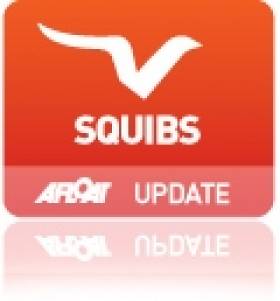Displaying items by tag: Olympian
Squib Northerns Won By Driscoll & Cagney
#squib – With weather and wind conditions that ranged from light and shifty to strong and gusty, the Rodgers & Browne Irish Squib Northerns took place last weekend (30/31st May) at the Royal North of Ireland Yacht Club. After very competitive and tight racing, John Driscoll and David Cagney on Aficionado took the title of Northern Champions.
A total of 18 boats competed with entries from the home club, Strangford Lough and all the way down to Cork. It was great to see so many squibs on the start line with a very high standard of fleet, including past Olympians, National and Northern Champions. At the end of day one the championship was very much open, leaving it all to play for on the Sunday. The conditions were tough and the race team, under the guidance of Nigel Kearney, skilfully managed to set five good races to complete the series.
On Day one, and under light conditions, race one started and with much jostling John Driscoll and David Cagney on Aficionado took first place ahead of David Eccles and Phil Hutchinson on Inshallah, Peter Kennedy and Gavin Vaughan on Joint Venture and Gordon Patterson and Ross Nolan on Quickstep III. Wyatt Wright and James Porter on Fat Boat Slim and Killyleagh boat Robert Marshall and Ryan Withers on Slipstream all putting in good performances within the top ten
Race two saw the Patterson/Nolan pairing on Quickstep III take line honours from Greg Bell and Leah McCleave on Prodigal and Des Clayton and Paul Henry on Inismara sailing a great race to take third. Johnny Miller and Sally Watson on High Flyer and Cork boat Too Dee sailed by Dave Sheehan and Carol Ann Rohan were both close to the lead at times during a race which had some massive shifts.
Race three saw a slightly stronger 10 knot breeze coming from the south, but this did nothing to remove those shifts. Eccles/Hutchinson on Inshallah were over the line early, went back, and with a nice left shift led the race on lap one from Greg Bell and John Driscoll with Gordon Patterson in fourth position. But with shifty conditions Greg bell on Prodigal got through and extended to win the race. Race three also saw Johnny Park and Bob Stinson on Gizmo climbing their way up the fleet.
Day two dawned with very different wind conditions. With dark foreboding skies, heavy rain showers and a late night the night before, a couple of competitors opted out of sailing and decided to stay on land!
Nigel Kearney got the reduced fleet racing started with a good clean start from all competitors. There was great close racing and first to round was George and Philip Cromie on Dotzboat from Killyleagh, liking the conditions. Fred Campbell was next on Halloween, Joint Venture and followed by Des Clayton on Inismara fourth. The windy condition suited new faces with new competitors appearing in the top ten. As the fleet rounded the windward mark for the second time, Joint venture led with a nice calm hoist by Andrew Vaughan, taking over from his Dad, Gavin in the crew spot. Aficionado worked up the fleet to round second following a perfect lift up to the layline, then Quickstep with a great hoist by Ross Nolan ahead of Fred Campbell on Halloween. Peter Kennedy and Andrew Vaughan on Joint Venture won, Aficionado second and Quickstep III in third position.
The fifth and final race saw Aficionado leading on the left of the beat but under pressure from Joint venture and Quickstep III, with Quickstep delaying the tack to come in late on the layline and sneak the lead from Aficionado. By the second round, Aficionado was in the lead from Joint Venture heading downwind when a big 35-knot squall covered the race course. Some boats got their kites away in time, others held on for some fun surfs, but there were a few knock downs and broaches in the fleet, with Halloween in sixth place going over and filling up with water very quickly. In the end John Driscoll and David Cagney on Aficionado won a very close final race and took championship by four points from Peter Kennedy and the Vaughans, with Gordon Patterson and Ross Nolan in third position.
Full results downloadable below :
1st Aficionado 78 RNIYC John Driscoll David Cagney
2nd Joint Venture 64 RNIYC Peter Kennedy Andrew & Gavin Vaughan
3rd Quickstep III 820 RNIYC Gordon Patterson Ross Nolan
4th Prodigal 146 RNIYC Greg Bell Leah McCleave
5th Inshallah 139 RNIYC David Eccles Phil Hutchinson
Annalise Murphy Lines up for SB3 Eastern Championships in Howth
Unless last year's champion Gareth Flanigan and his crew can beg, steal or borrow a boat, they won't be able to defend their title and a new winner will be crowned on May 1st. The recent Spring Warmer Series saw some boats post inconsistent results while two teams in particular stepped up from last year to place themselves in the running.
Eoin Quinlan's decision to team up with Mike Evans and Peter Frane with 'Shockwave' looked like a smart one, with consistent results putting them on top of that series, and giving them the confidence to make the top 3 or 4 places at the Easterns.
John O'Driscoll of the Royal St.George is another skipper in flying form and will be hopeful of a good overall result next weekend. HYC's own 'Sharkbait' (Ben Duncan/Brian Moran/Rick Morris) can never be under-estimated and will be tipped to be among the prime contenders.
A feature of the event is the entry of several women helms, the most notable being Olympic hopeful Annalise Murphy of the National YC with her mother (and former Olympian) Cathy MacAleavey crewing.































































